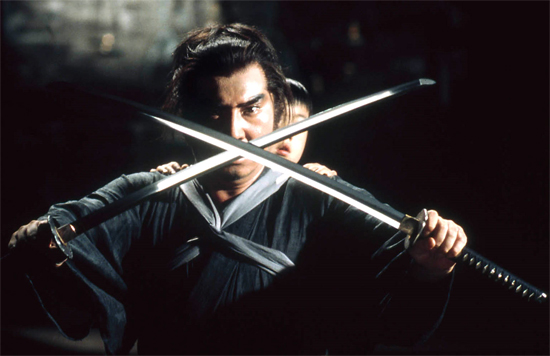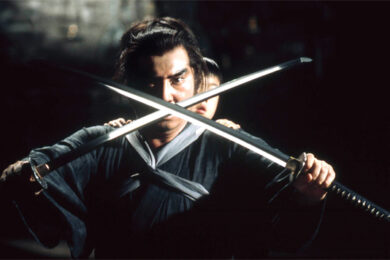"Then, one night, the Shogun sent his ninja spies to our house. They were supposed to kill my father, but they didn’t… That was the night everything changed."
For hiphop fans of a certain age, the opening sequence of Shogun Assassin (1980) is likely to prompt a certain Proustian rush, an attack of deja vu. One of the genre’s most celebrated and successful records, Liquid Swords, in name the second solo album from the GZA but in fact as much a showcase for the talents of all nine members of the Wu-Tang Clan, is peppered from end to end with samples from the film, like some exotic spice added to an already fairly piquant dish. The record follows the album almost isomorphically, starting where it starts and ending where it ends, copiously imbibing of the movie’s narrative themes and conceptual mythology along the way.
The above quoted refrain, from the beginning monologue of both record and film, is succeeded in the former with the first of RZA’s trademark languid beats, and a burst of Willie Mitchell’s Memphis soul. The film, by contrast, follows with the first instance of one of its most characteristic features: the slash of a blade, a splash of crimson. The GZA’s voice breaks in, "When the MCs came, to live out their name… "
It is as though blood and beats, the sword and the mic, are metonymically related, analogically substitutable, with rival MCs as the Shogun’s ninjas, their threatening presence bursting in on the scene. The record’s cover shows a pitched battle on a checkerboard plain, a galactic starburst in the background. The figure in the foreground – the Genius himself, one presumes – has a mic in one hand and a sword in the other. Just two pieces from his personal armoury, equally essential.
"Don’t be afraid. Bad dreams are only dreams… What a time you chose to be born."
In a sense, Shogun Assassin is composed in much the same way as Liquid Swords: material from different sources is chopped and spliced according to a narrative logic of its own devising, with voices, synths and electronic beats added afterwards by the producers. Shogun Assassin is a mash-up of a film, cut together from the first two entries in the popular Japanese Jidai-geki series, Lonewolf and Cub (Kozure Ōkami: Kowokashi udekashi tsukamatsuru and Kozure Ōkami: Sanzu no kawa no ubaguruma), which followed the path of the Shogun’s former executioner turned venge-seeking assassin, accompanied by his three-year old son in a wooden pram.
Former assistant to Otto Preminger, and Warhol Factory hanger-on, David Weisman, acquired the rights from Toho studios for $50,000, off the back of his first film, Ciao Manhattan (1972). With his partner, Robert Houston, fresh from playing the hapless Bobby Carter in Wes Craven’s The Hills Have Eyes, the pair set about re-cutting the films and adding their own voices, even employing a team of deaf lip-readers to help write dialogue that would (almost) fit the picture.
Though it was released onto the grindhouse circuit by Roger Corman’s New World Pictures, and in the UK, its gruesome murders and copious fake blood earned it a Home Office ban, it doesn’t share the cheap and nasty look of many its fellows on the ‘Video Nasty’ list. Kozure Okami had been a hugely popular and influential manga in Japan since 1970, and the film adaptations were directed by Kenji Misumi, several of whose earlier films – Sword Devil (1962) and Destiny’s Son (1965), for example – have been the object of serious critical appraisal for their impressionistic style and abstract imagery. A contemporary Japanese journalist once remarked that Misumi’s highly aesthetic approach to carnage suggested an "unconscious auteur."
"Choose the sword and you will join me. Choose the ball and you join your mother, in death. You don’t understand my words, but you must choose. So come boy, choose life or death."
In Liquid Swords, the GZA has transposed the legends of the samurai onto the parallel mythology of American gangsta rap, reflecting the fatalist preoccupation behind the theme of being born inescapably into a life of violence. ‘Duel of the Iron Mic’ juxtaposes sword battles with battle rhyming, the voice as weapon in a three-way contest for supremacy with Ol’ Dirty Bastard presiding as its saturnine umpire. But while gangsta rap has always been set against an urban backdrop, Shogun Assassin stays resolutely pastoral, with the assassin Ogami and his son Daigoru forced to stick to the forests and the plains because "the towns are dangerous."
For all its pastoral setting, however, Shogun Assassin depicts a nature transfigured. With most of the original soundtrack removed, the diegetic sounds of the natural world the characters stalk has been largely replaced by the throbbing and whooshing of a Moog Modular synthesizer. In preparing the American re-edit, Mark Lindsay, formerly the pony-tailed lead singer of Paul Revere and the Raiders, was hired to compose new music. The results were facetiously credited to the "Wonderland Philharmonic," when Wonderland was simply Lindsay’s house, and its "philharmonic" simply a reference to the orchestral versatility of the Moog synthesizer. Though, some of the original Japanese music, by Kunihiko Murai and Hideaki Sakurai, was retained; it is largely the synth work and motorik beats added by Lindsay, working with W. Michael Lewis, that gets sampled by the Wu Tang Clan.
Intriguingly, the film’s credits also list "psycho-acoustics" (!?) by Malcolm Cecil. Whether this is the same Cecil who, along with Robert Margouleff, played synths on Stevie Wonder’s early 70s albums and formed TONTO’s Expanding Head Band, I have been unable to ascertain. However, seeing as how Cecil went on to work on a number of films in the 80s and 90s (including Spike Lee’s (1991) Jungle Fever), and Margouleff had worked with Weisman as co-producer on Ciao Manhattan, it seems more than likely. This raises the enticing possibility that the modular synthesizer used on Shogun Assassin, and sampled on Liquid Swords, was in fact TONTO itself. The Original New Timbral Orchestra was the world’s first analog synth to feature true multimbral polyphony – i.e. to have the capacity to assign a different tone quality to every note on the keyboard.
"Your technique is magnificent… When cut across the neck, a sound like wailing winter winds is heard, they say. I’d always hoped to cut someone like that someday, to hear that sound. But to have it happen to my own neck is ridiculous."
In a recent book by Dominic Fox, the term "Cold World" (the book’s title) is employed, through an analysis of the discourses surrounding black metal, Ulrike Meinhof and the "terrible sonnets" of Gerard Manley Hopkins, to suggest a "world voided of human warmth and metaphysical comfort. This cold world is the world made strange… a world between worlds, a disfigured world." Though Fox’s title is an explicit reference to the "inanimate cold world" of Coleridge’s ‘Dejection: an Ode’, the implicit spectre haunting the scene is the self-same titled fifth track on Liquid Swords. Over samples from The Dramatics song, ‘In the Rain’, the GZA uncannily detournes the famous opening from the ‘The Night Before Christmas’ into a brutal narrative of violent unrest in the projects.
Just as much as the above mentioned track, Cold World‘s "aesthetics of dejection" describe equally the black mood of Shogun Assassin. A film about nature disfigured and made strange, about the "militant dysphoria" of the samurai for whom life continues only as an "irrational persistence," an undead longing for revenge. If this American re-edit of an old Japanese serial seems at times inchoate and disorganized, scenes appearing out of place and characters drained of any realistic affect, this only enhances the sense that the film’s logic is itself strangely musical. And that music is cold, black, disconnected, unable or unwilling "to cohere into the "higher" truth of an aesthetic unity." For the assassin, like the terrorist militant, like the MC in the urban mythology of gangsta rap, the world is dominated by struggle, and only through struggle does it gain meaning.



